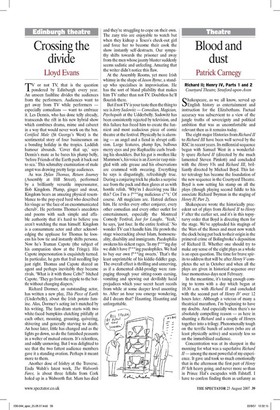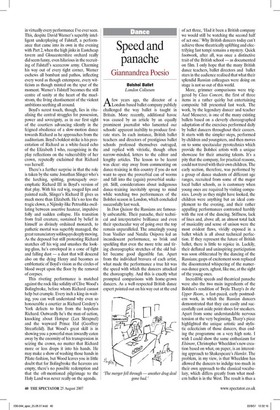Blood and dust
Patrick Camegy Richard II; Henry IV, Parts 1 and 2 Courtyard Theatre, Stratford-upon-Avon hakespeare, as we all know, served up English history as entertainment and instruction for the Elizabethans. Factual accuracy was subservient to a view of the jungle truths of sovereignty and political ambition that was as uncomfortable and relevant then as it remains today.
The eight major Histories from Richard II to Richard III have been well served by the RSC in recent years. Its millennial sequence began with Samuel West in a wonderfully spare Richard II (directed by the much lamented Steven Pimlott) and concluded with the Henry VIs and Richard III, brilliantly directed by Michael Boyd. This latter tetralogy has become the foundation of the new sequence in the Courtyard Theatre. Boyd is now setting his stamp on all the plays (though playing second fiddle to his associate Richard Twyman in the staging of Henry IK Part 2).
Shakespeare wrote the historically precedent set of plays from Richard II to Henry V after the earlier set, and it's in this topsyturvy order that Boyd is directing them for the stage. We've applauded his stagings of the Wars of the Roses and must now watch the clock being put back to their origin in the primeval crime of Bolingbroke's deposition of Richard II. Whether one should try to make any sense of the eight plays as a whole is an open question. The time for brave spirits to address that will be after Henry V completes the set in October and when all the plays are given in historical sequence over four momentous days next February.
In the meantime, it's taxing enough coming to terms with a day which began at 10.30 a.m. with Richard II and concluded with the second part of Henry IV over 12 hours later. Although a veteran of many a theatrical marathon, I'm beginning to have my doubts. And especially when there's no absolutely compelling reason — as here in shunting a Richard and a couple of Henrys together into a trilogy. Phenomenally tough on the terrific bunch of actors (who are at least physically active) and scarcely less so on the immobilised audience.
Concentration was at its sharpest in the morning for what was a superlative Richard — among the most powerful of my experience. It gave and took so much emotionally that in the afternoon the first part of Henry IV felt heavy going, and never more so than in Prince Hal's escapades with Falstaff. I have to confess finding them as unfunny as in virtually every performance I've ever seen. This, despite David Warner's superbly intelligent underplaying of Falstaff, a performance that came into its own in the evening with Part 2, when the high jinks in Eastcheap tavern and Gloucestershire orchard really did seem funny, even hilarious in the recruiting of Falstaff's scarecrow army. Charming his way out of every tight corner, Warner eschews all bombast and pathos, inflecting every word as though extempore, every witticism as though minted on the spur of the moment. Warner's Falstaff becomes the still centre of sanity at the heart of the maelstrom, the living chastisement of the violent ambitions seething all around.
Boyd's surest touch, though, lies in ritualising the central struggles for possession, power and sovreignty, as in our first sight of the courtiers advancing silently in the feigned obedience of a slow-motion dance towards Richard as he approaches from the auditorium. Boyd's boldest strike is his presentation of Richard as a white-faced echo of the Elizabeth I who, recognising in the play reflections on the vulnerability of her crown, reputedly exclaimed that Richard was herself.
There's a further surprise in that the role is taken by the same Jonathan Slinger who's the lurching, spitting, grotesquely overemphatic Richard III in Boyd's version of that play. With his red wig, rouged lips and painted nails, Slinger's Richard II gives us much more than Elizabeth. He's no less the tragic clown, a Nijinsky-like Petrushka oscillating between assertive hauteur, impulsive folly and sudden collapse. His transition from frail creature, sustained by belief in himself as divinely ordained monarch, to pathetic mortal was superbly managed, the great renunciatory soliloquys deeply moving. As the deposed but still protesting Richard snatches off his wig and smashes the looking-glass, he's enveloped in a cone of light and falling dust — a dust that will descend also on the dying Henry and becomes as emblematic of Boyd's vision as the circles of blood swept upon the floor by the removal of corpses.
This riveting performance is matched against the rock-like solidity of Clive Wood's Bolingbroke, before whom Richard cannot help but crumple. Every inch a king-in-waiting, you can well understand why even so honourable a courtier as Richard Cordery's York defects to him from the hopeless Richard. Outwardly he's the man-of-action, knocking about Hotspur (Lex Shrapnel) and the wayward Prince Hal (Geoffrey Streatfeild). But Wood's great skill is in showing you a powerful man inwardly eaten away by the enormity of his transgression in seizing the crown, no matter that Richard more or less drops it into his hands. He may make a show of washing those hands in Pilate-fashion, but Wood leaves you in little doubt that for Bolingbroke the heavens are empty, there's no possible redemption and that the oft-mentioned pilgrimage to the Holy Land was never really on the agenda.










































 Previous page
Previous page